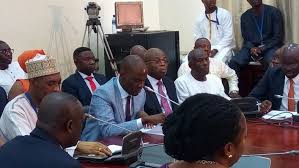The Minority in Parliament has warned the Governor of the Bank of Ghana, Dr Ernest Addison against continuing to print money to sponsor the government’s budget, saying it is against the law and would also spike inflation.
“The Bank of Ghana has started printing money for the government – financing government operations. As we speak, they have printed GH¢5.5 billion for the government and the Governor sounded, as part of the monetary policy committee meeting that they are going to even print more. Do you know what it means? It is inflation and inflation steals from you and me”, the Ranking Member of the Finance Committee, Mr Cassiel Ato Forson said.
“I want to caution him that they should stop financing the Ministry of Finance against the law. We want to caution the Governor of the central bank that there are consequences to his action. If today, he is not questioned, tomorrow he will be questioned”, he warned.
“Parliament will not sit aloof for him to disregard the acts of this country. I will personally write to the Chairman of the Finance Committee to haul the Governor of the central bank to appear before Parliament and give us reasons why he has decided to disregard the Act of Parliament and do things contrary to what is in law at his own will. That should not be allowed to happen,” he said.
Background
The Bank of Ghana, on Friday, said it decided to support the budget of the government with GH¢10 billion against the economic shocks caused by the COVID-19 pandemic, which has, so far killed 29 out of the 5,735 confirmed cases in the country.
At its Monetary Policy Committee meeting at which it announced the maintenance of the policy rate at 14.5 per cent, the regulator said: “The COVID-19 pandemic has put a severe strain on the budget, manifesting in petroleum revenue shortfalls as a result of plunging crude oil prices, shortfalls in import duties, other tax revenues, and non-tax revenues”.
“Preliminary assessments”, Governor Dr Addison noted, “show that the financing gap that was estimated at the time of applying for the IMF RCF in March has widened significantly, resulting in a large residual financing gap”.
Dr Addison said: “Current market conditions in the wake of the pandemic, will not allow the financing of the gap from the domestic debt capital markets without significantly increasing interest rates”.
“Under the circumstances and in line with section 30 of the Bank of Ghana Act, 2002 (Act 612) as amended, the Bank of Ghana has triggered the emergency financing provisions, which permits the Bank to increase the limit of BoG’s purchases of government securities in the event of any emergency to help finance the residual financing gap.
“Today, under the Bank of Ghana’s Asset Purchase Programme, the Bank has purchased a Government of Ghana COVID-19 relief bond with a face value of GH¢5.5 billion at the Monetary Policy Rate with a 10-year tenor and a 7 moratorium of two (2) years (principal and interest).
“The Bank stands ready to continue with its Asset Purchase Programme up to GH¢10 billion in line with the current estimates of the financing gap from the COVID-19 pandemic”, Dr Addison said.
Source: Class FM
 Home Of Ghana News Ghana News, Entertainment And More
Home Of Ghana News Ghana News, Entertainment And More





